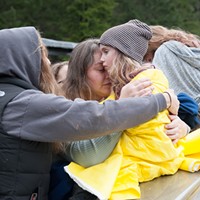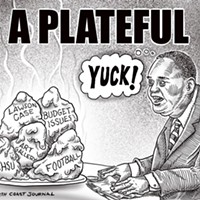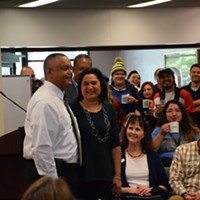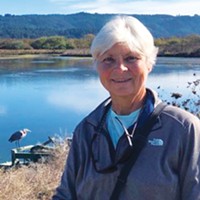The Administrator: Five Questions for HSU's New President
Before Tom Jackson Jr. officially took the reins, he sat down with the Journal
By Thadeus Greenson [email protected] @ThadeusGreenson[
{
"name": "Top Stories Video Pair",
"insertPoint": "7",
"component": "17087298",
"parentWrapperClass": "fdn-ads-inline-content-block",
"requiredCountToDisplay": "1"
}
]
When Tom Jackson Jr. strode into the Corbett Conference Room in Humboldt State University's Siemens Hall one morning in June, he hadn't even officially taken over as the eighth president in the university's more than 100-year history. That day came last week, when Jackson was given a university identification card and control over what is arguably Humboldt County's most important institution. But Jackson, who earned the distinction of being the first president in the California State University system to be on campus the day he was voted into office, was already dressing for the role. Punctuating his black suit and crisp white dress shirt was a vibrant green and gold striped tie.
Working on a tight schedule as he familiarized himself with the university he would soon be running, Jackson gave the Journal 15 minutes of his time on June 7. Campus spokespeople warned he wasn't yet up to speed on the details of the university's budget, complexities of HSU administrators' past decisions or the intricacies of Humboldt County life, but said he wanted to begin to introduce himself to the community.
Jackson, 59, comes to HSU from a four-year tenure as president of Black Hills State University in Spearfish, South Dakota, and steps into the position vacated by Lisa Rossbacher, who retired last month after a tumultuous and generally unpopular five-year presidency defined by budget cuts, growing discord between the campus and the community, and allegations that she didn't do enough to protect and support students of color. Jackson — who said he is the fourth member of his family to carry the name Tom Jackson Jr., the first being a freed slave in the South — is HSU's first black president and the campus' first leader to come from a strictly administrative background without classroom teaching experience in at least 35 years.
In his brief conversation with the Journal — which touched on HSU's strengths and challenges, why he got into university administration and what he can do to help heal inherited wounds — the military veteran was soft-spoken, thoughtful and almost unflinchingly positive. Here's a transcript of the conversation, lightly edited for clarity.
North Coast Journal: Reading your resume, it is apparent that you are a career administrator. What caused you to pursue a career in university administration and how would you describe your administrative philosophy?
Tom Jackson: Interesting. I went to Southwest Minnesota State University — Southwest State — for my baccalaureate degree and I was very, very involved in student organizations. I ran track, was active in student government, wrote for the newspaper, became a [resident advisor], a center manager of student life ... along with being a business major at one point in time. You know, you get to that moment of, 'What am I going to do after I graduate,' and it hit me: I'm doing it right now. I'm working with students and I'm leading in higher ed. So I mentioned it to one of the professionals — two of them, the center director and the director of residence life, two different individuals — and they said very quickly, 'If this is what you want to do, working in a university setting helping students, then go off and get your master's degree.'
And they promptly guided me and mentored me on how to package myself to get a good grad assistantship at a university and that launched my career. So it was really about working with students and being a trainer's trainer, a mentor's mentor, and one thing led to the next, which led me to here. But it really started simply as just wanting to help students be successful in a university setting. And over time, opportunities presented themselves and each one gives you a stronger tool box that gets you to really try to improve the environment of students who come through the door.
Now there's noble reasons for doing this: helping students become part of the educated citizenry, giving them a better quality of life, helping them maneuver through the maze of a university system, helping them be sources of pride for their families. All of those things are certainly part of the equation but at the root, it really was and still is about helping the students.
NCJ: In both studying HSU from afar and your brief time so far on campus, what would you identify as the university's biggest challenges and its greatest strengths?
Jackson: I'll start with the biggest strengths. I would say that's the pride of the community. There's an enormous sense of pride, not only in Humboldt State but also in this community. And I'm referring primarily to Arcata, but there's pride throughout Eureka and McKinleyville, as well. That pride shows itself in the passion of the words that people speak but it also shows itself in the alumni and the desire for this to be the absolute best university it can be. Where I think the strength lies is actually in the community and the relationships with the community.
We tend to focus right now on what isn't working but there are a thousand things that are working, and those thousand things are all the volunteer hours this university provides the people that live in the community that help drive the economic engine, or providing service time to agencies, the connectedness between the community and the campus — those are really, truly the strength. Now, we could refer to that as the amazing people who live in this area but I'm just referring to it simply as the connectedness between the university and the community is its strength.
It also, in its own way, is its challenge because the two talk and the two are essentially the same. And because we communicate so freely and openly, it gives us that blueprint for how we each need to evolve and become better and those are soft spots for both the community and the university. So, in essence, the community and the university are working through their relationship to be the ideal place that we want to be. I refer to that as modeling the global community because Humboldt, Arcata — this North Coast region — is a place that could be anything it wants for a lot of different reasons. But it also is a place that already is modeling the global community, working through those dynamics of what it means to be a modern-day society dealing with these types of issues that not only impact the university setting but also impact the community. But by working together, going back to the strength, it will.
NCJ: You touched on this a bit in your last answer — that connectedness between the community and the university at times creating challenges. When you spoke to one of our reporters on your first day here at the university library, you mentioned there were a lot of conversations taking place in the president's office at that point about "healing." There have been a number of decisions made recently by HSU administration that have been hurtful to segments of the community, not just the outcomes of those decisions but how they were made — and I'm speaking specifically about the elimination of HSU football, major reductions at KHSU and the closing of the Third Street Gallery — so I'm curious to hear from you how you plan to heal those wounds and prevent similar ones from occurring in the future.
Jackson: I think honestly that the institution as a whole never intends to annoy people through its decisions. It makes the best decision it can given the information it happens to have at that time. And you know as well as I that the institution is going through a correction. When enrollment dips, resources have to be discovered in different ways and the university has to react, just like the community as a whole has to react when tax revenues are down. And so in essence, just like stocks and other investments, this university is going through a correction.
During that correction, one would say, it would help if we were just a little more transparent. And so when I talk about healing, it's about trying to share more information so that individuals can understand the dynamics of the university, maybe the sausage making of running a university, so there's at least some understanding of why certain decisions may be made or had to be made. I think that would go a long way to helping individuals understand why the university is doing what it's doing and why it doesn't intend to harm anyone.
But the question I want to ask the community in that same breath is how do we move forward from that, because my message is about positivity, looking outward and looking upward. And recognizing our strengths and abilities, targeting those and playing off of those, so we can celebrate the amazing things we are as a community, as a whole. So it's, what do we need to do not only as a community but as a university to move past those things that are behind us and really celebrate what we want to celebrate as what we would call 'the North Coast.' And once we get to that point and answer those questions, I think we'll be past that.
NCJ: As I'm sure you're aware, last year the local branch of the NAACP called on HSU to stop recruiting students of color until it can effectively support and protect them on campus and in the local community. How would you respond to prospective parents who are concerned about this statement and what do you plan to do, on campus and off, to make sure students of color who come to receive their education at HSU are supported?
Jackson: I would say that students of color are not just one set of 'students of color' and to cluster individuals into one category is unfair to the many individuals who enter a university setting. Going to college is a special privilege. It's a very, very special privilege. ... We also expect things of college graduates that aren't necessarily expected of other individuals, sometimes. So to cluster individuals into one category is really unfair to the families who, for their whole life, wanted their sons or daughters to experience a university setting.
That's not to say that each university in California or across the United States shouldn't try to provide the best, positive, meaningful experience for every student who comes through the door. More simply put, if the student is good enough to enter a university, then that university has to be good enough to keep them. That's the challenge. No university is perfect at that. Some are better at it but it takes into account not only the university's ability to do it but also the individual's ability to do it.
You and I both know it's not intended to be an easy success story. It's intended to be challenging. And those challenges are often (faced) in a controlled setting at the university. So dealing with injustices, whatever they may be, is very important to the growing process of an individual because a university life compares nothing to the life we have to live after the university life. College was a long time ago for me. A lot more has happened that has challenged me after college than in college. And so that's what we're preparing our students to really do.
So I want every student of color not to just react to that one moment or those singular statements, recognizing that it is a process and that's what separates those who finish from those who don't start. I want every student of color to come to this university and help this university be the absolute best it can be.
NCJ: I wanted to end on a personal note. Obviously, accepting a position like this, uprooting your family and moving them across the country, there's a professional element to a decision like that but there's also a very personal element. Personally speaking, why did you feel Humboldt County was a good place to move your family to, a good place for you guys to live that next chapter together?
Jackson: Let me go back a couple of segments just before then. I was at a university, coming up through the ranks. I already told the story about the first professional position I had and one leading to the next. Somewhere in there, I became a vice president, twice. And colleagues around me, including myself, would say, 'Why aren't there more women of color and men of color in positions of presidents?' And the easy answer was none of us were aspiring to them. It wasn't that we were trying, it was that we liked the jobs we had.
I really enjoyed being a vice president for student affairs. One could say it's one of the best jobs on the planet, working with students and doing all the things we get to do on a regular basis. But if we're going to try to get more people in the ranks of the presidency, someone has to say, 'I'm going to give up a really good job to take a presidency,' not knowing it's also a really good job with different challenges. So I heard that call and I said, 'Well, I've got to at least adhere to some of the same challenges that others are challenging me to do,' so I took it.
I went after a presidency and fortunately it was Black Hills State University that provided me the perfect opportunity to lead, I believe, a fantastic university, one that my daughter, I hope, will graduate from one day. I can't say anything bad about Black Hills State University. I led it and it's a beautiful, wonderful university.
But we also knew that we had the skillsets and Humboldt was looking for a leader to follow the leadership of President Rossbacher — and there's some similarities, not only the natural beauty and the ocean, but a regional, remote area that played, I think, fairly nicely with things that we thought were very important to us as a family and so we put our name into the hat. And you never know. It's not something that is given by any measure.
We just hope we're given the chance and we do the absolute best we can and maybe by the end of a dozen years, or however long they let us stay here, people will look back and say, 'They did the best they could and the place is better as a result of it.' But it leads me back to the very first point I made, which is, I do what I do to provide the best positive, meaningful experience for our students. And I can start every day with that and I know at the end of every day I've done something to at least make it more meaningful.
Thadeus Greenson is the Journal's news editor. Reach him at 442-1400, extension 321, or [email protected]. Follow him on Twitter @thadeusgreenson.
Speaking of...
Comments
Showing 1-1 of 1
more from the author
-
Seeking Salvation
'Living in amends,' a candidate for resentencing hopes for another chance
- Apr 18, 2024
-
UPDATE: Artillery Shell Deemed Safe in Ferndale
- Apr 12, 2024
-
Turning the Titanic
Cal Poly Humboldt recognized for leadership in addressing global plastics crisis
- Apr 11, 2024
- More »
Latest in News
Readers also liked…
-
Through Mark Larson's Lens
A local photographer's favorite images of 2022 in Humboldt
- Jan 5, 2023
-
'To Celebrate Our Sovereignty'
Yurok Tribe to host gathering honoring 'ultimate river warrior' on the anniversary of the U.S. Supreme Court ruling that changed everything
- Jun 8, 2023







































